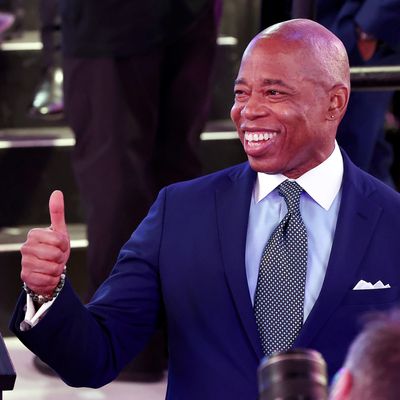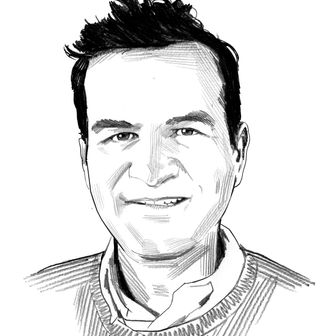
To understand the difference between Bill de Blasio and Eric Adams — the difference between the man who was mayor yesterday and the man who replaced him today, the difference, in other words, between what the past eight years were like and what the next four (or longer) may foretell — consider that on December 30, one day before he, by city charter, had to leave the job, the current mayor had already cleared out, hosting a “clap out” ceremony so staffers could cheer his exit.
Adams, by contrast, bounded onstage in Times Square mere minutes after his term began to be sworn in on an oversize family Bible, eschewing the traditional January 1 midday inauguration ceremony in front of City Hall for this one, at the Crossroads of the World, when the nation’s eyes were peeled to the global capital of New Year’s Eve celebrations.
Surrounded by family and some of his top advisers, Adams took the oath of office on a stage where, just a few minutes before, Journey had blasted fog and confetti and “Don’t Stop Believin’” (“Strangers, waitin’ / Up and down the boulevard / Their shadows / Searchin’ in the night / Streetlights, people”).
The whole event had an air of unreality, a city celebrating a grim milestone gripped in the midst of its second year of a debilitating pandemic, in springlike 55-degree weather with a slimmed-down crowd of masked and vaxxed celebrants knocking inflatable Planet Fitness–branded thunder sticks together on cue. After 11 o’clock, audio of the biggest news stories of the year was piped into the crowd, a reminder of what the past 12 months had been like: the botched evacuation of Afghanistan, supply-chain issues, inflation, and disease and death on a scale never quite seen before by anyone now alive.
Mike Bloomberg had also taken the oath of office from Times Square on New Year’s Eve, doing so in the months after 9/11 at a moment much like this one, when the city’s future was in doubt. Adams takes over not just at a time when COVID cases are skyrocketing but as the city faces a nearly $3 billion budget deficit, amid spiraling housing costs, and while crime and homelessness are exploding — indeed, on Mayor Adams’s first day on the job, he took a ceremonial subway ride with the press and witnessed an assault on the street below the platform and was accosted by drunk and homeless men in the train car.
Adams is the most charismatic politician to hold the job in a generation; he was at Times Square hobnobbing with the event’s hosts for hours before he was slated to be sworn in. He can be a cheerleader for a city desperately in need of one. But much of what he intends to do, the trade-offs he hopes to make, remains unknown. He is a favorite of the Bloombergian business class while promising to carry into City Hall the hopes of families like his own, one that lived on the edges of poverty in southeast Queens and Brownsville, Brooklyn. He has promised a bit of everything — that the city can curb crime while eschewing overly aggressive policing, that government can run better without laying off its workforce, that housing can be built that meets the needs of the poor, of the workers who build and the real-estate developers who finance it. There remain questions about his personal finances and some of his associations, but his first hires in City Hall were mostly well-regarded career professionals.
“Other than the new job as Mayor of New York City — how awesome is that — what are you most looking forward to in 2022?” asked Jonathan Bennett, the Dick Clark of the evening, 90 minutes before the ball drop.
“Our comeback,” Adams said as a gigantic neon billboard advertising Drew Barrymore’s new cookbook, Rebel Homemaker, shed its light across the square. “It is just great when New York shows the entire country how we come back. We all lived through our Pearl Harbor moment. It may be the Great Depression, the attack on Pearl Harbor, it may be COVID, but the reality is the resiliency of our city and our country. We showed the entire globe what we are made of. We are an unbelievable city, and trust me, we are ready for a major comeback because this is New York.”
“BECAUSE THIS IS NEW YORK CITY! THAT IS WHAT WE DO, NEW YORK!” Bennett yelled before telling Adams he has a couple of unpaid parking tickets that need taking care of.
“Do you know a guy?” he beseeched the incoming mayor.
Adams returned to the stage after the ball had dropped, and actors playing Aladdin, the Phantom of the Opera, and someone from the musical Chicago danced to the song “New York, New York.” Adams held aloft a photo of his mother, Dorothy. Walking offstage and out into what is often described as the second toughest job in America, he flashed a thumbs-up and a wide smile underneath his surgical mask.
“How does it feel?” a reporter yelled to him
“New York is back!” Adams said, and left.






























